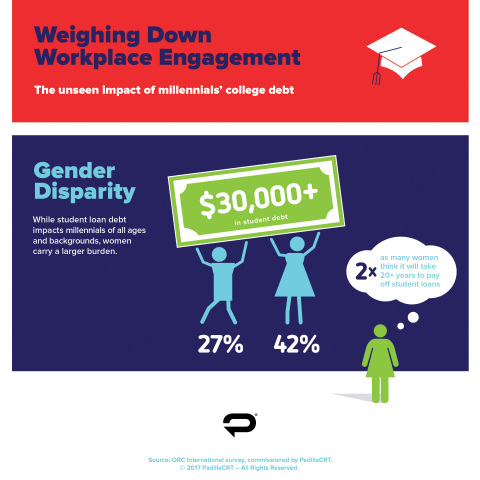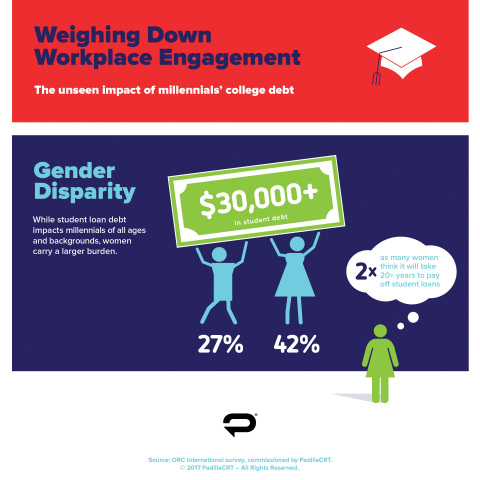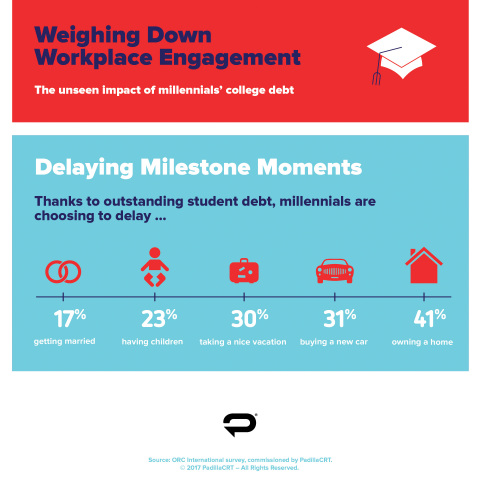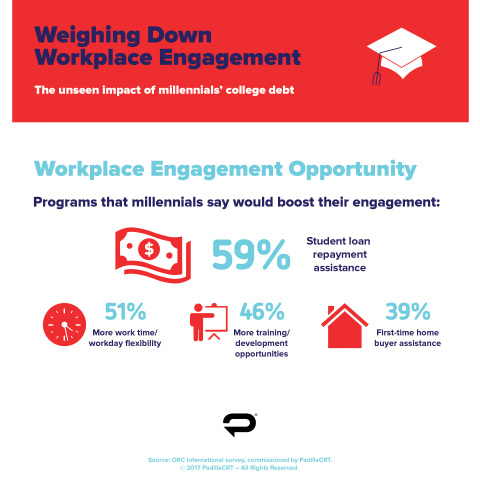MINNEAPOLIS--(BUSINESS WIRE)--Seventh paragraph, second sentece should read: Over time, highly engaged workforces outperform less-engaged companies by 147 percent higher earnings per share and enjoy a 90 percent better growth trend, according to a 2013 Gallup study (instead of Over time, highly engaged workforces outperform less-engaged companies by 147 percent higher earnings per share and enjoy a 90 percent better growth trend, according to a 2013 Harvard Business Review study).
The corrected release reads:
COLLEGE DEBT WEIGHS ON WORKPLACE ENGAGEMENT
Millennials with Large Amounts of College Debt Harder to Retain and Incent
In sheer numbers, millennials may soon rule the workplace. But new research indicates that the crushing amount of student loan debt they have incurred will rule key life milestones (i.e., marriage, children and homeownership) and affect their level of engagement at work.
According to an ORC International survey commissioned by PadillaCRT, a top 10 independent public relations and communications agency, a large percentage of millennials believe their student loan repayments will last well into their 30s and even 40s. Survey results reveal:
- One in four millennials owe more than $30,000 in college debt, and expect to take more than 20 years to pay off their loans.
- Women are two times more likely than men to think it will take more than 20 years to pay off their college debt.
As a result, millennial employees don’t feel financially secure. This financial insecurity delays traditional life events, impacts how they engage with the workplace and affects how employers can retain them.
“Every month, millennials are making student loan payments, which can feel like a mortgage payment,” said Natalie Smith, senior vice president, PadillaCRT, who leads the agency’s employee engagement team within its Corporate Practice. “This student loan debt impacts millennials of all ages and backgrounds. Given the competition for top talent, employers must update their approach in order to engage and retain millennials, especially among women, who were found to carry a bigger burden of student loan debt.”
Smith is referring to the study findings that:
- Forty-two percent of women have more than $30,000 in college debt, compared with 27 percent of men.
- Thirty-seven percent of women are less likely to stay with their current employer because of their current financial situation, compared with 25 percent of men.
Student loan assistance trumps flexibility
For millennials, the next 10 to 20 years after college typically include major life milestones. From purchasing a new car and buying a house to getting married and having children, the survey showed millennials are choosing to delay these milestones because of their outstanding debt. These delays not only impact their personal life, but also their engagement levels at work.
For companies, engaged employees are more than just nice to have – they’re integral to business success. Over time, highly engaged workforces outperform less-engaged companies by 147 percent higher earnings per share and enjoy a 90 percent better growth trend, according to a 2013 Gallup study.
With millennials expected to make up 75 percent of the workforce by 2025, it’s imperative that companies understand how their needs, preferences and life stages drive their approach to and engagement with work. However, based on a 2016 Gallup study, companies are still missing the mark – only 29 percent of millennials consider themselves engaged at work, less than all other generations. And survey results revealed similar alarming stats that companies need to be aware of as their workforce changes:
- Only 55 percent of millennials feel like they have a good idea of what is going on at their company.
- Fifty-nine percent of millennials value student loan repayment assistance over other options, including more workday flexibility (51 percent) – a new finding compared to previous surveys that placed flexibility at the top of the list of engagement drivers.
“Engaged employees show greater initiative and approach work more passionately and creatively – essentially, they are willing to put in extra effort to help their company succeed. But when it comes to creating an engaged workforce, one size does not fit all. To excite and engage employees, companies must keep employees’ ages and life stages in mind,” said Smith.
To engage and retain millennials – and other employees – companies should consider the following:
- Purpose is powerful: Invite millennials to play an active role in building a corporate culture that engages them and drives the company forward.
- Culture is key: Celebrate the small wins and create opportunities for employees to see the impact they are making.
- Options are essential: Align benefits and opportunities for involvement with employee preferences and give employees opportunities to choose those that are relevant for their age and stage.
“Engaging and retaining millennial employees is a challenge all companies face,” said Smith. “However, companies that understand the personal and financial situations facing millennials after graduation, and then tailor their engagement strategy accordingly, will reap the benefits of a highly engaged workforce that is willing to go the extra mile to drive the company forward.”
View the “Weighing Down Workplace Engagement” infographic at padillacrt.com.
About the ORC International survey
PadillaCRT commissioned
ORC International to survey 1,000 millennials with at least a four-year
college degree between the ages of 22-35 on May 24-29, 2016 to take a
closer look at the impact student loan debt is having on this
generation. Respondents for this survey were selected from among those
who have volunteered to participate in online surveys and polls. Because
the sample is based on those who initially self-selected for
participation, no estimates of sampling error can be calculated. ORC
International is a collaborative and consultative research partner to
hundreds of organizations around the globe.
About PadillaCRT
PadillaCRT is a top 10 independent public
relations and communications company. Its 240 employee-owners use
insightful strategies to help clients develop purposeful connections
with the people who are important to their success. The company’s
360-degree approach leverages research, brand strategy, advertising,
design, digital, social, mobile, media relations, events and crisis
management expertise to build corporate and product brands with
customers, investors, employees and communities. Brand consultancy Joe
Smith and market research firm SMS Research Advisors are integral parts
of PadillaCRT. FoodMinds, an award-winning food and nutrition
communications and consulting company, is a wholly owned division of
PadillaCRT. Clients include 3M, Barnes & Noble Education, BASF, Bayer,
Blue Cross Blue Shield of Minnesota, GE, Hass Avocado Board, Land
O'Lakes, Mayo Clinic, Prosciutto di Parma, Rockwell Automation, U.S.
Highbush Blueberry Council, the Virginia Lottery and Xcel Energy.
PadillaCRT is a founding member of The Worldcom Public Relations Group,
a partnership of 143 independently owned partner offices in 115 cities
on six continents. Make a connection at padillacrt.com.






